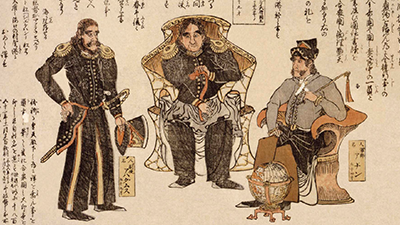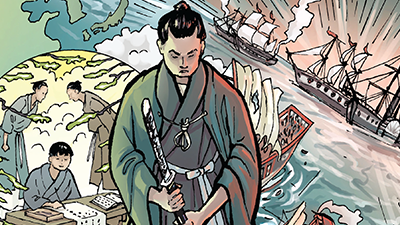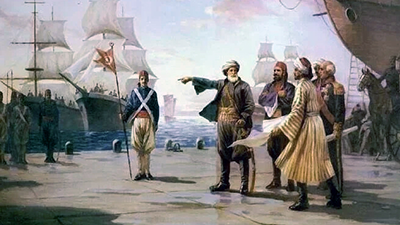Comparing Industrialization in Egypt and Japan
Driving Question: How did Egypt and Japan experience industrialization in the nineteenth century?
Industrialization didn’t follow the same path everywhere. In this lesson, you’ll explore how Egypt and Japan each responded to the global spread of industrialization. By comparing their goals, challenges, and outcomes, you’ll consider why some countries successfully industrialized—while others struggled to keep up.
Learning Objectives:
- Use evidence to evaluate how industrialization spread to Egypt and Japan.
- Use the historical thinking practice of comparison to explore how two different nations attempted to industrialize in the nineteenth century.
- Use a graphic biography to support, extend, or challenge the overarching narratives of this period.
Vocab Terms:
- capitalist
- factory
- industrialization
- modernization
- reform
- restoration
- tariff
Opener: Industrialization in Egypt and Japan
To teach this lesson step, refer to page 2 of the Lesson 7.6 Teaching Guide.
The Data Literacy Guide has clear strategies to help teach data literacy and build student confidence with data visualizations.
Would you stop the wheels of change if you could? Explore some hypotheticals to decide what—if anything—you’d do different if given the chance.
Industrialization in Japan
To teach this lesson step, refer to page 3 of the Lesson 7.6 Teaching Guide.
The Three Step Reading for Graphic Biographies: Tool is a great resource for helping students dig into this genre.
Japan’s path to industrialization was unlike any other. Read the article to discover what made it unique, and then take a closer look at one key figure through a graphic biography.
-
Guiding Questions
-
Before you read
Preview the questions below, and then skim the article. Be sure to look at the section headings and any images.
While you read
Look for answers to these questions:
- Why was the arrival of American warships shocking to the Japanese?
- What internal problems in Japan got worse after Perry’s arrival?
- Did the Meiji Restoration actually return power to the emperor?
- How did Japan’s new political system differ from the old one?
- What reforms helped modernize Japan?
After you read
Respond to this question: What effect did the Meiji Restoration have on communities? Support your answer with evidence from the article.
-
Guiding Questions
-
Before you read
Preview the questions below, and then skim the comic, paying attention to things like prominent colors, shapes, and types of text and fonts. How do you know where to start and in which direction to read? What’s in the gutters (the space between panels)? Who or what is the focus of the comic?
While you read
Look for answers to these questions:
- Where did Iwasaki Yatarō come from?
- Why did many people in Japan want to industrialize in the late 1800s?
- What role did Yatarō play in Japan’s industrialization?
- What does the quote from Yatarō’s biographer suggest about his legacy?
- How does the artwork show changes in Japan and in Yatarō’s life?
After you read
Respond to this question: How does this biography of Iwasaki Yatarō support, extend, or challenge what you have learned about the impact of industrialization on people and societies?
Industrialization in Egypt
To teach this lesson step, refer to page 5 of the Lesson 7.6 Teaching Guide.
Need to cover the important skill of historical comparison but feeling a little pressed for time? Read more on Comparison of Egypt & Japan in the Community Forum.
How did industrialization take different forms around the world? Explore Egypt’s unique path in the article, then compare what you’ve learned about Egypt and Japan in the activity.
-
Guiding Questions
-
Before you read
Preview the questions below, and then skim the article. Be sure to look at the section headings and any images.
While you read
Look for answers to these questions:
- What steps did Muhammad Ali take to modernize Egypt?
- Why did borrowing money from European banks cause problems for Egypt?
- What are the three explanations for this failure?
- How did some Islamic scholars react to Egypt’s failures?
After you read
Respond to these questions: Which of the three explanations given for the failure of Egypt’s industrialization is most convincing to you? Why?
Closer: Industrialization in Egypt and Japan
To teach this lesson step, refer to page 9 of the Lesson 7.6 Teaching Guide.
You’ve learned about the different paths to industrialization experienced in Egypt and Japan. In this short activity, you’ll imagine yourself in the shoes of different people in those countries.
Industrialization Around the World
To teach this lesson step, refer to page 9 of the Lesson 7.6 Teaching Guide.
Industrialization spread to different regions and nations at different times. The effects of industrialization on those places varied dramatically.






